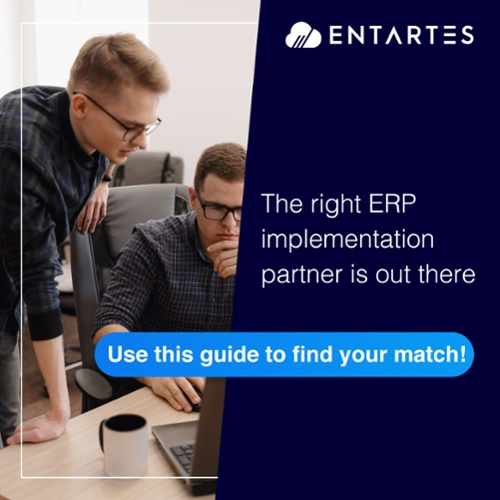Which are the top NetSuite ERP implementation consultants in the United States? We did our research...
Implementing ERP Directly Or With A Partner: Which Is Better?
Is there a difference between implementing the best ERP software for your business with the assistance of the original developer compared with a consultant? Each vendor option is unique and comes with its advantages and disadvantages. Your business resource planning and management needs will determine which type of vendor is adequate.
In this blog we dig deeper into the 3 crucial selection criteria we recommend our clients to follow to choose between the two. There are also 4 key takeaways from this blog that we want to make sure you walk out with.
A successful enterprise resource planning (ERP) implementation process will add value to your investment.
For it to be successful, however, your ERP vendor must assist in the process throughout, especially if this is the first time your business integrates a management software solution.
Should you buy and implement an ERP with the original developer or with an implementer?
An ERP developer is the original equipment manufacturer (OEM), also known as platform provider, software developer, or maker, whether on-premise or cloud-based. Some providers offer implementation directly as an added-value service while others outsource it to a third party through a business partnership to expand capabilities, data, and workflow reach, Oracle NetSuite says.
An implementer is a third-party integrator or facilitator, also known as ERP implementation consultant. Some sell ERP software, as resellers or merchants, and implementation services, while others only provide the second service. Their role is often to facilitate the integration with the ERP, generally, in alliance with the developer, reducing customer acquisition costs, gaining quick wins in market share, and developing reliable and repeatable deployment processes, Oracle NetSuite adds.
Once you’ve done your research of the ERPs available out there, follow these 3 criteria to realize which vendor alternative offers the implementation process that your business needs.
Implementation reputation
Is implementation assistance part of the initial service? If so, find out how much experience your vendor has implementing the ERP.
It’s one thing for a developer to excel at manufacturing the software, but helping customers adopt it successfully is entirely different. Believing that the original manufacturer is better at implementing an ERP is one of the 8 most common myths about ERP implementation that you need to stop believing.
Likewise, an implementer may follow the same procedure regardless of company or industry, which may or not work for your business’ technical demands.
The best way to start comparing the two is to make informal inquiries with partners, providers, and clients about how their implementation process worked. They should know your business well, and their insight in the following issues proves an invaluable filter to make a shortlist, Select Hub says:
-
Handled the transition.
-
Dealt with existing legacy systems.
-
Demonstrated industry experience.
-
Provided a trustworthy and secure experience.
Ask them if the implementation process improved or hindered their perception of their provider's reputation as a facilitator. ERP Software Blog is adamant when stating that you should select a vendor with a successful deployment track record that uses your input and feedback as input throughout.
In this sense, factor in the human aspect of the implementation process. Often overlooked, be sure to assess the capabilities and expertise of managing the transition on both sides, your vendor’s and your team’s.
Also, check what ranking and review portals like G2 and Capterra have to say and see what other users from the same industry and company size comment on your vendor. Make sure to check both positive and negative reviews and dig deeper into difficulties and success stories.
Cost
There are often many expenses that come with the deployment process after the initial purchase of the software license in order to work successfully.
This cost depends entirely on what the manufacturer or the integrator includes in the contract. For that, ask yourself if you want the relationship to include integration only or higher-value benefits, Panorama Consulting adds. Similarly, ERP integration expenses will depend on several issues, to name a few:
-
Company size
-
Features and modules
-
Number of end-users
-
Time of deployment
Migration from a legacy system or zero
-
Customization
-
Training, support, and maintenance services
From these, customization is an essential issue to factor in. Some ERP developers or implementation consultants could offer to modify the original software programming to accommodate your business needs at no charge or an additional cost.
Thus, Select Hub recommends you to rough estimate your ROI and clarify all expenses before signing any contract and avoiding going over budget.
Training, support, and maintenance
These are after-sale services that you’ll want to clear up with your vendor as early in the process as possible, ideally when requesting quotes. They are crucial both to the deployment process and your budget.
As you evaluate if the OEM or the implementer is your best option, make sure to ask:
-
Will these services be part of the licensing fee or at an extra cost?
-
What sort of training will your team get?
-
Will training be through remote or on-premise tutorials and classes?
-
Would you be receiving dedicated assistance from the support team?
The same questions go for technical support and maintenance alongside:
-
Are updates to the software included in the base price, or would it demand extra investment?
-
How often would updates be, and would they require additional training and support?
4 key takeaways from this blog
- Some ERP developers and implementers offer assistance to deploy the software successfully in your business as part of the licensing fee, while others charge extra.
- Your vendor’s experience and expertise in implementing an ERP solution in your particular industry is a key differentiator.
- You can take care of the implementation in-house, but you should ask yourself if your team is trained for it.
- If this is your first ERP, you’ll want the implementation to run as smoothly as possible to avoid friction.



.jpg?height=200&name=ERPImplementation2%20(1).jpg)

.jpg?height=200&name=ERP%20implementation%20problems%20(1).jpg)
Blog Comments